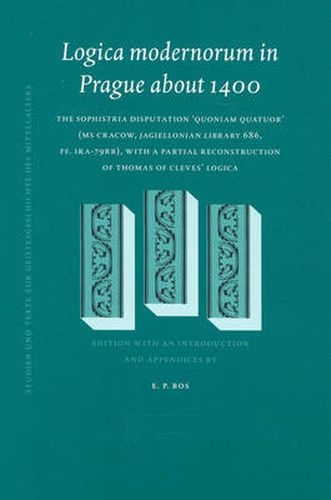Readings Newsletter
Become a Readings Member to make your shopping experience even easier.
Sign in or sign up for free!
You’re not far away from qualifying for FREE standard shipping within Australia
You’ve qualified for FREE standard shipping within Australia
The cart is loading…






An anonymous tract is preserved in Cracow, Jagiellonian Library 686, ff. 1ra - 79rb. The tract is a specimen of the art of sophistria, It is intended to help students avoid problems concerning fallacies and ambiguities of words. The tract originates from Prague. It was written around 1400. The manuscript was brought to Cracow. The contents are primarily the logical and semantic topics also found in textbooks by Peter of Spain, Marsilius of Inghen, Thomas Manlevelt, Thomas of Cleves and Richard Billingham. The main topics are: sophistria as a science; signification; syncategorematic terms; supposition; ampliation, restriction; complex signifiables, the significate of a proposition; mediate and immediate, resolvable, exponible and functionalizable terms; propositions with a term in the comparative or superlative form; exceptive, exclusive and reduplicative propositions. Apart from the presentation of sometimes original views, one of the results of this edition is the partial reconstruction of the Logica by a master Thomas of Cleves, This Logica has not been preserved elsewhere. Our sophistria is also worth study as a testimony of the use made around 1400 of the works of Richard Billingham who wrote an influential Speculum puerorum, Billingham is especially interested to test propositions by individual things in reality. This logical handbook was a kind of successor and alternative to Peter of Spain’s Tractatus,
$9.00 standard shipping within Australia
FREE standard shipping within Australia for orders over $100.00
Express & International shipping calculated at checkout
An anonymous tract is preserved in Cracow, Jagiellonian Library 686, ff. 1ra - 79rb. The tract is a specimen of the art of sophistria, It is intended to help students avoid problems concerning fallacies and ambiguities of words. The tract originates from Prague. It was written around 1400. The manuscript was brought to Cracow. The contents are primarily the logical and semantic topics also found in textbooks by Peter of Spain, Marsilius of Inghen, Thomas Manlevelt, Thomas of Cleves and Richard Billingham. The main topics are: sophistria as a science; signification; syncategorematic terms; supposition; ampliation, restriction; complex signifiables, the significate of a proposition; mediate and immediate, resolvable, exponible and functionalizable terms; propositions with a term in the comparative or superlative form; exceptive, exclusive and reduplicative propositions. Apart from the presentation of sometimes original views, one of the results of this edition is the partial reconstruction of the Logica by a master Thomas of Cleves, This Logica has not been preserved elsewhere. Our sophistria is also worth study as a testimony of the use made around 1400 of the works of Richard Billingham who wrote an influential Speculum puerorum, Billingham is especially interested to test propositions by individual things in reality. This logical handbook was a kind of successor and alternative to Peter of Spain’s Tractatus,